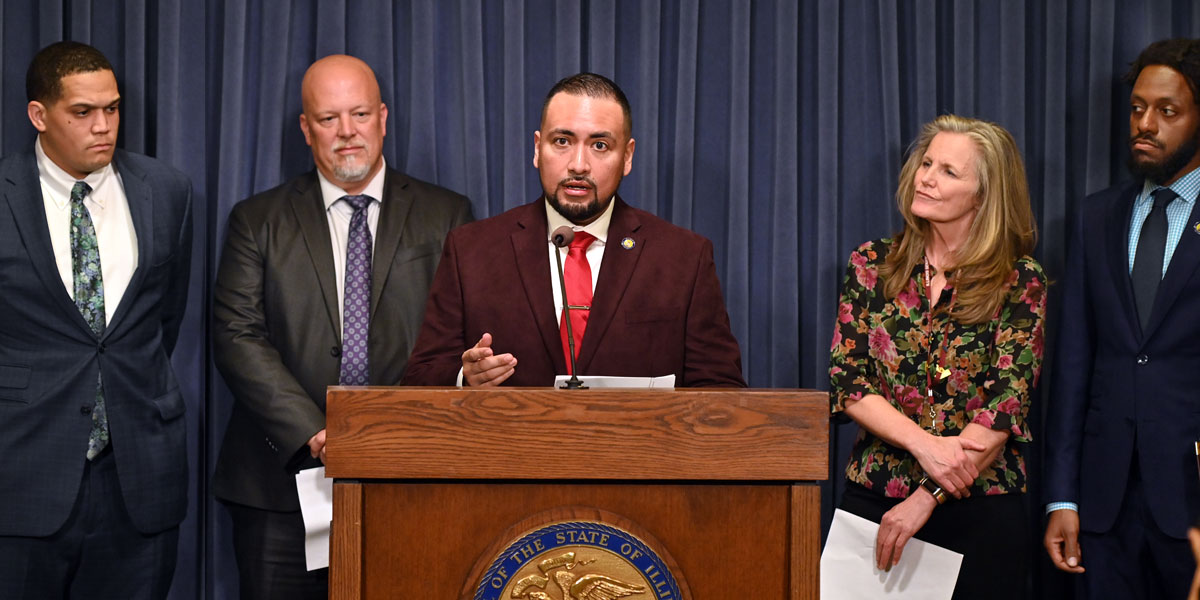 SPRINGFIELD – As the nation grapples with an ongoing mental health crisis, members of the Illinois Senate Democratic Caucus are working diligently to engage greater accessibility to care. During a press conference Wednesday, they outlined their measures to enhance the mental health workforce and strengthen services.
SPRINGFIELD – As the nation grapples with an ongoing mental health crisis, members of the Illinois Senate Democratic Caucus are working diligently to engage greater accessibility to care. During a press conference Wednesday, they outlined their measures to enhance the mental health workforce and strengthen services.
To encourage more people of color to enter the mental health care profession, State Senator Javier Cervantes is championing a measure to require the Illinois Student Assistance Commission to create a program to award scholarships to students pursuing a career as a mental health professional in Illinois. The scholarship – created under Senate Bill 1322 – would be open to all students, but give preference to applicants from various minority groups.
“This initiative prioritizes applicants from underrepresented communities, addressing both our critical provider shortage and the pressing need for a workforce that reflects the diverse populations it serves,” said Cervantes (D-Chicago). “By working to remove financial barriers to education, we can create pathways for passionate individuals to pursue these essential careers while simultaneously building a more inclusive mental health system for all residents."
To further attract and retain mental health care workers, State Senator Laura Ellman has outlined a measure – Senate Bill 1225 – to add them to the list of professions eligible for the Child Care Assistance Program. The Child Care Assistance Program provides financial assistance to low-income families to help cover the cost of child care, enabling parents to work, attend training or go to school.
“It is hard to find mental health care when you need it, because there just aren’t enough professionals out there,” said Ellman (D-Naperville). “By expanding access to child care assistance for families in the mental health, health care, and educational workforce, we can ensure parents no longer have to choose between their professions and family responsibilities while also retaining workers in workforces that are struggling to attract employees.”
Building trust and rapport with a mental health provider can often be daunting, leading State Senator Mike Simmons to spearhead Senate Bill 2287. The measure would prohibit private insurers, Medicaid, and state group health plans from charging an individual out-of-pocket costs greater than they would in network if they receive mental health services from a nonparticipating provider or health care facility. Expanding on that measure, Simmons’ Senate Bill 2353 would ensure there is no limit on the number of visits per week for outpatient mental health treatment.
“I’ve brought forth Senate Bill 2287 because effective and helpful mental health care requires consistency, and this bill makes sure patients can see a mental health provider that is the right fit for them regardless of insurance network with no danger of incurring fees or out of pocket costs,” said Simmons (D-Chicago). “Senate Bill 2353 will empower patients and providers – not insurance companies – with the autonomy to decide the frequency and timing of their own mental health treatment plans.”
Additionally, State Senator Robert Peters is leading a measure ensuring a more thorough and thoughtful rollout of critical services by extending the implementation deadline of the Community Emergency Services and Support Act – also known as CESSA – to July 1, 2027. In addition, Senate Bill 2500 would require new training for mobile mental health relief teams and an updated data collection structure, transforming how mental health emergencies are handled and offering a strong framework for individuals in crisis and the organizations that serve them.
“We must meet the growing mental health needs of our communities by providing the necessary resources, training and structure to ensure every individual in crisis gets the help they deserve,” said Peters (D-Chicago). “This is about keeping people safe and providing them with the right support when they need it most.”
Members of the Illinois Senate Democratic Caucus will continue to work on legislation to enhance mental health care throughout the legislative session. Read descriptions of each bill discussed in this press conference here.













 © 2026 Illinois Senate Democratic Caucus
© 2026 Illinois Senate Democratic Caucus